|

Colt Model M .32 ACP serial number 567645 issued to
Major General Lloyd R. Moses on September 5, 1963.

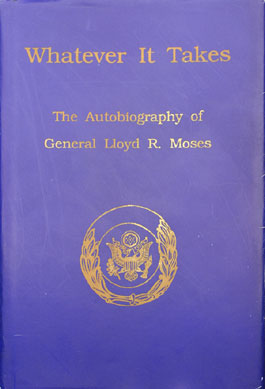 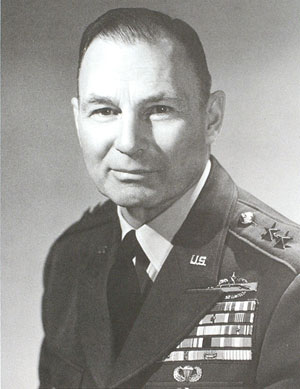
Lloyd Roosevelt Moses was
born on September 4, 1904 to James H. Moses and Alice O.
Shelden in Fairfax, South Dakota. Alice Shelden was of
Sioux heritage. Moses attended White Thunder Indian Day
School in Mellette County and Colome High School, in
Colome, S.D.
From 1925-1927, Moses was a
rural schoolteacher for the Rosebud School District and
later he was the deputy county superintendent of
schools. He then studied Chemistry at the University of
South Dakota from 1927-1931. He was a member of the USD
ROTC and received a commission of Lieutenant in the Army
Reserve. It was also at USD where he met his wife, Ruth
West. They were married on February 14, 1935. In 1932,
Moses was employed as an instructor of Chemistry at
Sioux Falls College and he also worked for the Witte
Paint and Chemical Company.
Moses served in the Army
Reserves until 1940. One of his tours of duty included
working with the Civilian Conservation Corps (CCC) in
Breckenridge, Minnesota. In 1940, he was called into
active duty. Moses trained soldiers in Missouri and
Alabama until 1945 when he was sent to Europe to serve
with the 507th Parachute Regiment. He worked
on the European theater staff and was included in the
airborne assault over the Rhine. At the end of World
War II (1939-1945), he became post commander at Sendai,
Japan.
Moses was once more in
combat while commanding the 31st Infantry
Regiment during the Korean War (1950-1953). He served
again in Japan from 1953-1954 and then returned to the
United States to serve at Fort Leavenworth and Fort
Dix. In 1957, he was assigned to the Southern Area
Command in Munich, Germany. Moses commanded the 8th
Infantry Division from 1959-1960 and U.S. Fifth Army
(1960-1964). He retired from the Army as a Major
General in 1964 and settled in Vermillion, South Dakota.
After retirement, Moses
served as the director of Institute of Indian Studies
(the current Institute for American Indian Studies) at
the University of South Dakota from 1967-1974. He was
instrumental in developing Indian related Courses at USD
and overhauling the direction and purpose of the
Institute. Moses was active with the South Dakota State
and the Clay County Historical Societies. He was an
avid sportsman, writer and historian. He was also
involved with publishing several books including his
autobiography Whatever it Takes, Who’s Who
Among the Sioux (written with T. Emogene Paulson),
and Paulson’s Sioux Collections. Moses was a
member of the Rosebud Sioux Tribe and he was given the
Indian name of Tokaha Waste Wicasha (good leader).
Moses died on Aug. 22, 2000. Moses and his wife are
buried in Arlington National Cemetery, Washington, D.C.
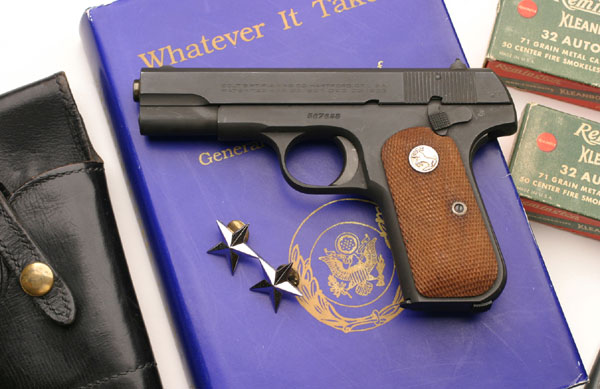
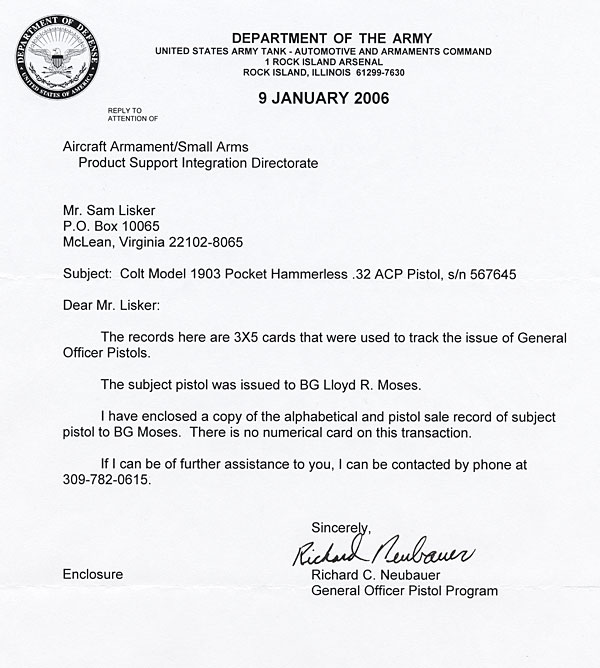
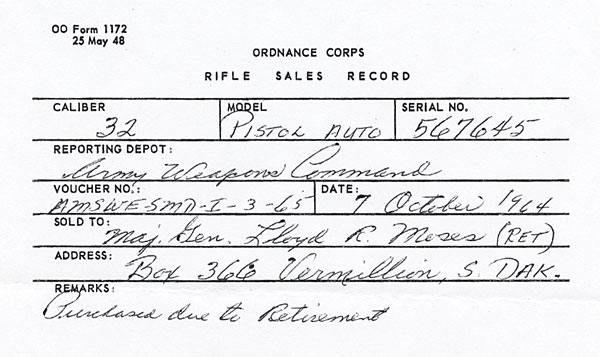
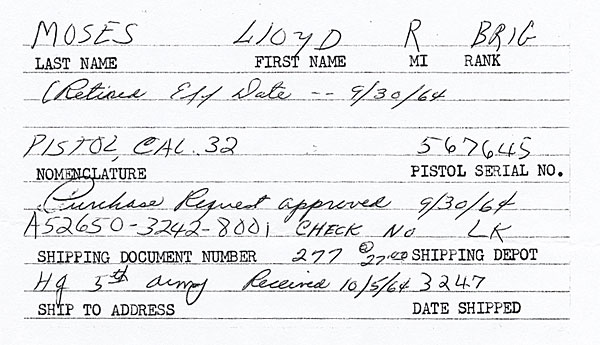
Congressional Record - GENERAL LLOYD
MOSES (Senate - November 09, 1995)
Mr. DASCHLE. Mr. President, I would like to
take this opportunity to recognize the outstanding life and
military career of a veteran of the Second World War:
Retired Major General Lloyd Moses who currently resides in
Vermillion, SD.
General Moses came from humble beginnings. He was born in
1904 on what was then the Rosebud Sioux Indian Reservation
in Fairfax, SD. His mother was half Sioux Indian. His father
was a carpenter.
Despite not having a formal grade school education, General
Moses graduated from High School and the Black Hills
Teachers College, and obtained a degree in Chemistry from
the University of South Dakota.
General Moses enjoyed a long and illustrious military
career. In 1933, General Moses applied for Active Duty in
the U.S. Army and was promoted to the rank of first
lieutenant in 1935. During World War II, he served as a
battalion commander of the 75th Infantry Division and
volunteered to participate with the 507th Parachute
Regiment, 17th Airborne Division in `Operation Varsity,' the
airborne assault across the Rhine River in 1945.
In the Korean War, General Moses commanded the 31st Infantry
and in 1955 was promoted to the rank of brigadier general.
In 1957, he was promoted to the rank of major general.
General Moses reached the pinnacle of his military career in
1960 when, following in the footsteps of other generals such
as George McClellan, Andrew Jackson, and Ulysses S. Grant,
he became commanding general of the 5th U.S. Army.
His military awards include the Distinguished Service Cross,
the Silver Star for heroics in Korea, and the Distinguished
Service Medal, the Nation's highest peacetime military
award. General Moses retired in 1964 as the highest ranking
South Dakotan ever to serve in the U.S. Army.
General Moses remains committed to the promise of education.
After retiring from the military, General Moses returned to
the University of South Dakota and became the director of
the Institute for American Studies.
As an enrolled member of the Rosebud Sioux Tribe, he spent
the next 10 years successfully expanding the curriculum of
Native American courses at the University in an effort to
teach cultural awareness and encourage the continued
education of Native American youth. When he retired in 1974,
the enrollment of Native American students at the University
was at an all-time high, and the Institute for American
Studies was rapidly becoming one of the foremost centers of
oral history and tradition in the United States.
From such humble beginnings, General Lloyd Moses developed
the leadership and education that helped our forces to
victory in Europe 50-years ago and has continued to assist
our growth as a Nation. His story is proof that great deeds
can still come from hard work and a strong mind. And that
great men can still come from small places like Fairfax, SD.
| September 4, 1904
|
|
Born to James H.
Moses and Alice O. Shelden on Rosebud Sioux
Indian Reservation in Fairfax, SD |
| 1933 |
|
Active Duty |
| 1935 |
|
1st Lieutenant.
Moses was a member of the USD ROTC and received
a commission of Lieutenant in the Army Reserve. |
| 1925-1927 |
|
Moses was a rural
schoolteacher for the Rosebud School District
and later he was the deputy county
superintendent of schools. |
| 1927-1931 |
|
Studied Chemistry
at the University of South Dakota. |
| 1932 |
|
Moses was employed
as an instructor of Chemistry at Sioux Falls
College and he also worked for the Witte Paint
and Chemical Company. |
| 1940 |
|
Moses served in the
Army Reserves until 1940. One of his tours of
duty included working with the Civilian
Conservation Corps (CCC) in Breckenridge,
Minnesota. In 1940, he was called into active
duty. |
| 1945 |
|
Battalion commander
of the 75th Infantry Division. Moses trained
soldiers in Missouri and Alabama until 1945. He
then worked on the European theater staff and
volunteered to participate with the 507th
Parachute Regiment, 17th Airborne Division in
'Operation Varsity,' the airborne assault across
the Rhine River in 1945. |
| 1945 |
|
At the end of World
War II, he became post commander at Sendai,
Japan. |
| 1950-1953 |
|
Moses was once more
in combat while commanding the 31st
Infantry Regiment/7th Division during the Korean
War. |
| 1953-1954 |
|
He served again in
Japan from 1953-1954 and then returned to the
United States to serve at Fort Leavenworth and
Fort Dix. He retired from the Army as a
Major General in 1964 and settled in Vermillion,
South Dakota. |
| 1955 |
|
Commanded the 31st
Infantry and in 1955 was promoted to the rank of
brigadier general. |
| 1957 |
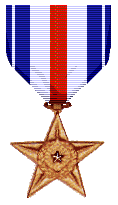 |
In 1957, he was
assigned to the Southern Area Command in Munich,
Germany. He was promoted to the rank of major
general. Awarded Distinguished Service Cross
and the Silver Star for heroics in Korea |
| 1959-1960 |
|
Moses commanded the
8th Infantry Division from 1959-1960. |
| 1960-1964 |
 |
Became Commanding
General of the 5th U.S. Army Distinguished
Service Medal |
| 1964 |
|
General Moses
retired in 1964 as the highest ranking South
Dakotan ever to serve in the U.S. Army. |
| |
|
After retiring from
the military, General Moses returned to the
University of South Dakota and became the
director of the Institute for American Studies.
|
| 1967-1974 |
|
After retirement,
Moses served as the director of Institute of
Indian Studies (the current Institute for
American Indian Studies) at the University of
South Dakota from 1967-1974. |
|
1974 |
|
Retired |
| August 22, 2000 |
|
Died |
|